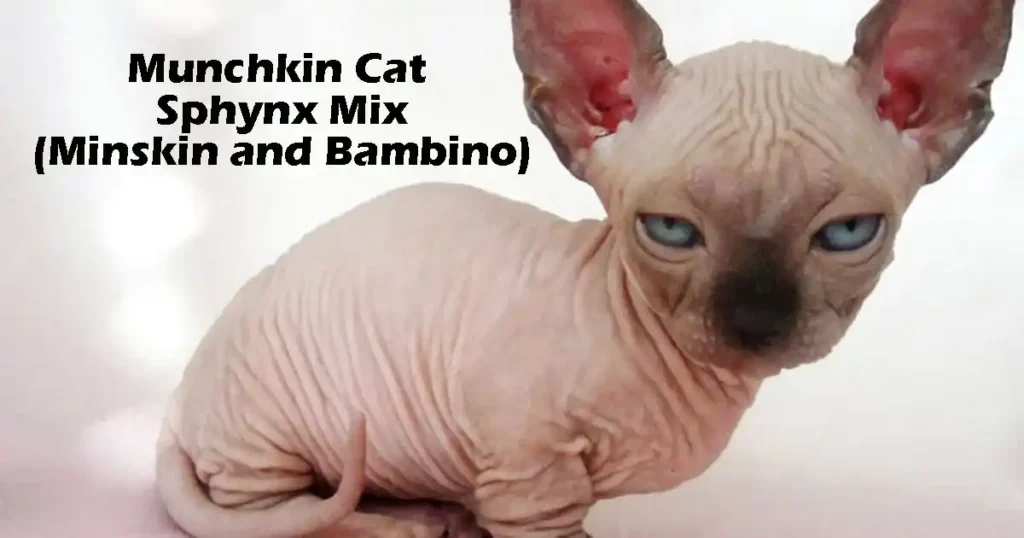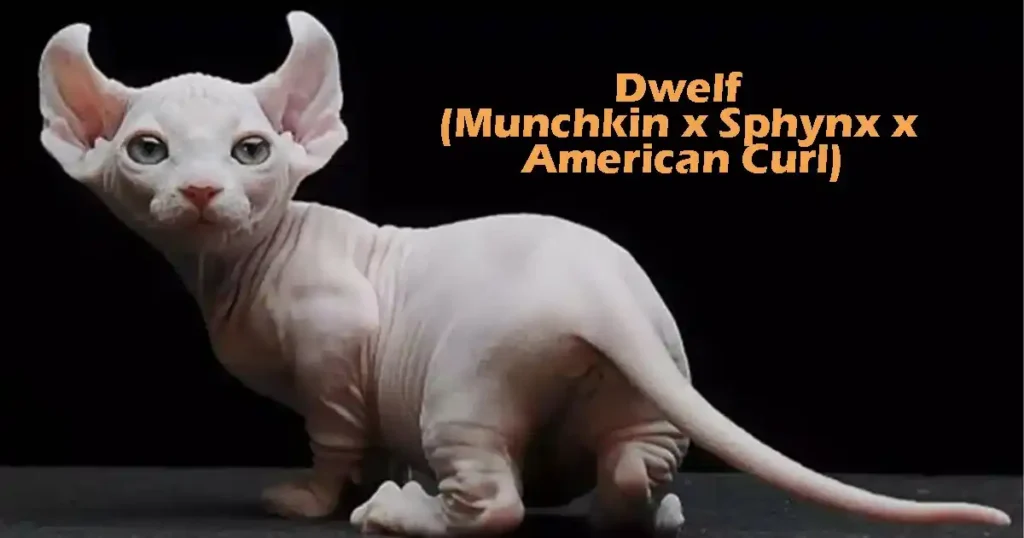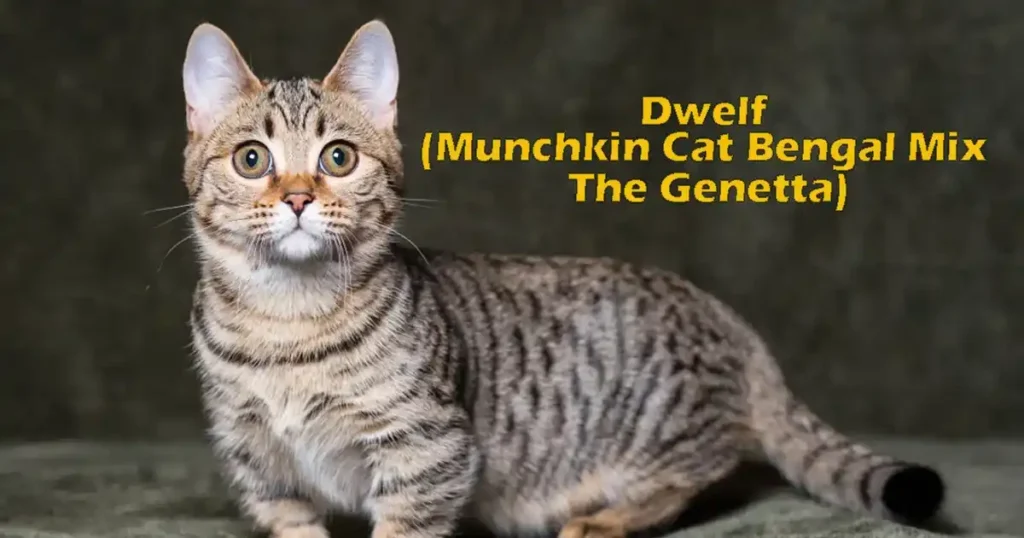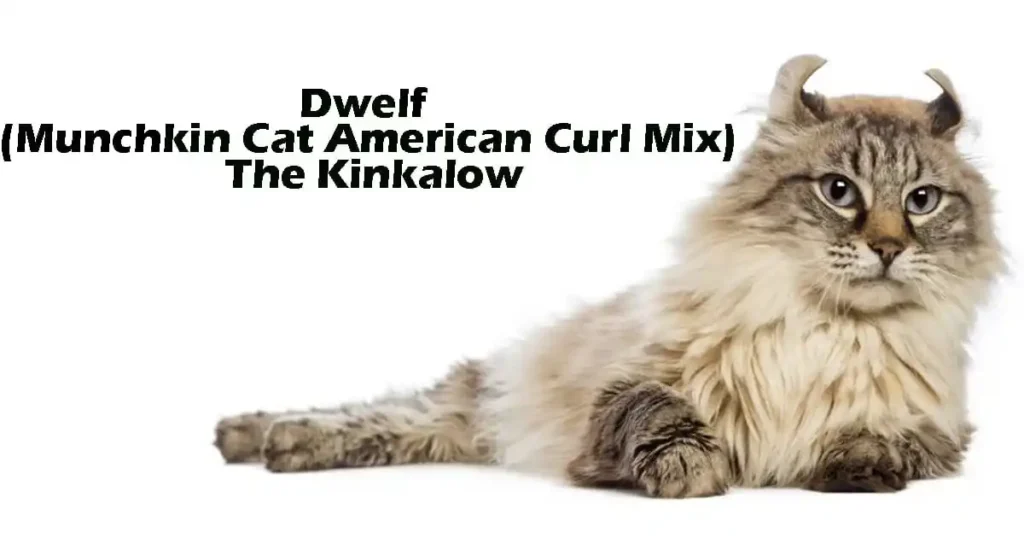The Munchkin Werewolf Cat is a unique and intriguing hybrid that combines the short-legged Munchkin breed with the distinctive appearance of the Lykoi, also known as the “Werewolf Cat.” This hybrid is characterized by its short legs, inherited from the Munchkin, and its patchy, wolf-like coat, a hallmark of the Lykoi. Below is a detailed overview of this fascinating feline.
Despite their short legs, they are surprisingly agile and love engaging in interactive play. Known for their sociability, they make excellent companions for families and adapt well to homes with other pets. However, their unique genetics require special care, from regular grooming to a diet that supports their energetic lifestyle.
Owning a Munchkin Werewolf Cat comes with its own set of joys and responsibilities. Understanding their health needs, temperament, and history is crucial for prospective owners. Whether you’re drawn to their wolf-like charm or their friendly disposition, this guide will provide all the details you need to make an informed decision.
Discover the Munchkin Werewolf Cat: A Fascinating Blend of Quirkiness and Charm
The Munchkin Werewolf Cat is a truly unique and eye-catching breed that combines the short-legged cuteness of the Munchkin with the striking, wild appearance of the Lykoi, or “Werewolf Cat.” Known for their partially hairless faces, patchy coats, and playful personalities, these cats are as mysterious as they are adorable.
Despite their somewhat eerie appearance, Munchkin Werewolf Cats are affectionate, social, and full of energy, making them wonderful companions for those who appreciate a touch of the unusual. Their curious nature and love for exploration mean they thrive in environments where they can play and interact with their human family. If you’re looking for a cat that’s equal parts quirky and lovable, the Munchkin Werewolf Cat is sure to captivate your heart.
Munchkin Werewolf Cat: A Comprehensive Guide
The Munchkin Werewolf Cat is a fascinating breed that combines the playful characteristics of the Munchkin cat with the striking appearance of the Lykoi, often referred to as the “Werewolf Cat.”
This guide delves into every detail about this unique feline, from its origins to its care requirements, ensuring you have all the information to understand and care for this rare and intriguing breed.
- Unique Hybrid Breed: Combines Munchkin’s playful traits and Lykoi’s wild, werewolf-like appearance.
- Physical Features: Short legs, compact size, and sparse roan-colored coat.
- Temperament: Affectionate, social, and highly active, making them excellent companions.
- Care Requirements: High-protein diet, regular grooming, and plenty of mental stimulation.
- Health Considerations: Prone to specific genetic issues from parent breeds, needing regular vet visits.
Origins and History of the Munchkin Werewolf Cat
The Munchkin Werewolf Cat is a fascinating hybrid, blending the unique traits of the Munchkin and Lykoi breeds. Its development stems from the desire to create a cat with the playful charm of the Munchkin and the striking, wild look of the Lykoi.
This section delves into the history of each parent breed and how they came together to create this rare feline.
The Munchkin Cat: The Foundation of the Breed
The Munchkin cat is best known for its short legs, a result of a natural genetic mutation. Despite their stature, Munchkin cats are agile, playful, and affectionate companions.
- Originated in the 1980s in Louisiana.
- Recognized as a distinct breed by The International Cat Association (TICA) in 1994.
- Known for their friendly, outgoing personalities.
- Nicknamed “rug huggers” for their small size.
- Loved for their variety of coat colors and patterns.
The Munchkin’s genetic traits make it a foundation breed for several crossbreeds, including the Munchkin Werewolf Cat.
The Werewolf Cat: The Lykoi Breed
The Lykoi cat, often referred to as the “Werewolf Cat,” is a unique and striking breed known for its unusual appearance, which resembles that of a werewolf. This breed’s defining feature is its sparse, patchy coat, which gives it a wild, almost eerie look.
The Lykoi’s fur is often described as “hairless in patches” with a rough, graying texture that enhances its mysterious vibe. Despite its somewhat intimidating appearance, the Lykoi cat is friendly, affectionate, and social, making it an excellent companion for families.
These cats are known for their playful and curious nature, and they form strong bonds with their human families often seeking attention and cuddles. Their distinctive look, combined with a loving personality, makes the Lykoi a fascinating and endearing breed.
- Discovered in feral cat populations in the early 2000s.
- The name “Lykoi” comes from the Greek word for wolf.
- Naturally occurring breed without forced mutations.
- Sparse fur, sometimes giving a near-hairless look.
- Energetic and inquisitive temperament.
The Birth of the Munchkin Werewolf Cat
By combining the traits of the Munchkin and Lykoi, breeders created the Munchkin Werewolf Cat, a breed with short legs and a distinct werewolf-like appearance. This crossbreed appeals to cat enthusiasts who appreciate uniqueness and playfulness.
Physical Characteristics of the Munchkin Werewolf Cat
The Munchkin Werewolf Cat stands out for its unique appearance, combining features from both the Munchkin and Lykoi breeds. Its small stature, wild fur, and captivating eyes make it a one-of-a-kind feline. Here’s a closer look at what defines this breed’s distinctive physical traits.
Size and Build
- Compact body with a sturdy frame.
- Short legs inherited from the Munchkin breed, which don’t affect mobility.
- Weighs between 5–9 pounds, depending on gender and genetics.
- Balanced proportions, despite its unique features.
- Agile and active, despite their size.
Coat and Fur Texture
- Sparse, roan coat with a patchy or wolf-like appearance from the Lykoi parent.
- Coat may appear thin, giving the cat a near-hairless look in some areas.
- Common colors include black, gray, and shades of roan.
Size and Build
The Munchkin Werewolf Cat typically inherits the short legs of the Munchkin and the wild-looking features of the Lykoi.
- Small to medium-sized breed.
- Compact body structure with a sturdy frame.
- Weighs between 5–9 pounds.
- Short legs don’t hinder their movement or agility.
- Distinct roan coat creates a “wolf-like” illusion.
Coat and Colors
The breed is best known for its unique coat that mimics the appearance of a wolf.
- Sparse fur with patchy patterns.
- Common colors include black, gray, and roan.
- Soft to the touch but requires regular grooming.
- Prone to shedding, especially during seasonal changes.
Physical Features Comparison
| Feature | Munchkin Cat | Lykoi Cat | Munchkin Werewolf Cat |
|---|---|---|---|
| Leg Length | Short | Standard | Short |
| Coat Texture | Dense | Sparse/patchy | Sparse with patches |
| Size | Small to medium | Medium | Small to medium |
| Appearance | Compact and fluffy | Wolf-like | Compact with wolf-like fur |
Temperament and Behavior
The Munchkin Werewolf Cat is not just a striking visual delight but also a lively and engaging companion. This hybrid breed combines the sociability of the Munchkin with the curious and playful nature of the Lykoi. Here’s what you can expect from their temperament and behavior.
Affectionate and Social
- Thrives on human interaction and forms strong bonds with family members.
- Friendly and approachable, making them great for households with kids and other pets.
- Enjoys cuddles and seeks attention but isn’t overly demanding.
- Loves being part of daily activities and spending time with people.
Playful and Affectionate
The Munchkin Werewolf Cat is known for its playful and friendly nature.
- Highly social and enjoys human companionship.
- Adapts well to families and other pets.
- Energetic despite their short stature.
- Loves interactive toys like feather wands or puzzle feeders.
- Exhibits curiosity and intelligence.
Their combination of friendliness and energy makes them a delightful addition to any home.
Health and Lifespan
Genetic Considerations
Both parent breeds have unique health concerns that may appear in the Munchkin Werewolf Cat.
- Munchkin Cats: Susceptible to lordosis (spinal curvature) and pectus excavatum (chest deformity).
- Lykoi Cats: Prone to skin issues and potential hair loss.
- Regular vet check-ups help ensure early detection of health problems.
Lifespan
The average lifespan of a Munchkin Werewolf Cat is 12–15 years, depending on care.
Health Overview
| Health Aspect | Munchkin Traits | Lykoi Traits | Munchkin Werewolf Cat |
|---|---|---|---|
| Common Concerns | Lordosis, joint issues | Skin conditions, hair loss | Combination of both |
| Dietary Needs | High protein diet | Balanced diet | High protein, low carb |
| Lifespan | 12–14 years | 12–15 years | 12–15 years |
Care Tips for Munchkin Werewolf Cats
The Munchkin Werewolf Cat is a one-of-a-kind feline known for its short legs, partially hairless coat resembling a werewolf, and a personality that’s as charming as its unique looks. Below are detailed tips to ensure their health, happiness, and well-being.
Understanding the Munchkin Werewolf Cat
- Unique Appearance
- These cats have a sparse, patchy coat that gives them their werewolf-like appearance.
- Their short legs, inherited from the Munchkin breed, make them look adorably compact.
- Loving and Loyal Personality
- Munchkin Werewolf Cats are affectionate and thrive on human interaction.
- They are highly playful, intelligent, and curious, keeping their owners entertained.
- Adaptable Temperament
- They adjust well to various environments, including small apartments.
- Sociable and good with children and other pets.
Essential Care Tips
1. Grooming and Coat Maintenance
- Coat Care: The sparse fur requires gentle grooming every week to remove dead hair.
- Bathing: Their partially hairless skin can become oily; bathe them monthly using a mild cat shampoo.
- Skin Protection: Protect their sensitive skin from sunburn or excessive cold.
2. Diet and Nutrition
- Feed high-quality cat food rich in protein to support their active lifestyle.
- Provide a balanced diet with occasional treats but avoid overfeeding to prevent weight gain.
- Fresh water should always be available to keep them hydrated.
3. Health Monitoring
- Regular vet check-ups are vital to detect and address potential health concerns early.
- Watch for signs of skin irritation or sensitivity, as their unique coat can predispose them to certain issues.
- Keep vaccinations and parasite prevention up to date.
4. Exercise and Enrichment
- Provide plenty of toys, interactive puzzles, and climbing structures to keep them mentally and physically stimulated.
- Short play sessions are ideal for their energy level and help prevent obesity.
5. Comfortable Living Environment
- Provide a warm, cozy bed and ensure they have access to safe resting spots.
- Avoid exposing them to extreme temperatures due to their sparse coat.
- Maintain a clean and accessible litter box suited to their shorter legs.
FAQs
What is a Munchkin Werewolf Cat?
A hybrid breed combining the Munchkin’s short legs and the Lykoi’s wolf-like features.
Are they hypoallergenic?
No, their sparse coat may still trigger allergies in sensitive individuals.
How much do they cost?
The price can range from $1,500–$3,000, depending on the breeder.
Do they have special care needs?
Yes, they require regular grooming and a balanced diet to maintain their health and coat.
Conclusion
The Munchkin Werewolf Cat is a captivating blend of two unique breeds, offering a combination of playful energy and striking appearance. However, potential owners should be prepared for the grooming and health care these cats require. If you’re considering adding a Munchkin Werewolf Cat to your family, ensure you source from a responsible breeder or adoption organization to support their well-being.



